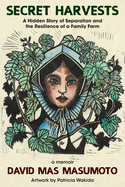
David Mas Masumoto has built a remarkable career as a third-generation organic peach and grape farmer, which has inspired his award-winning books, including Epitaph for a Peach (1995). Secret Harvests again features "the farm [he] had once rejected," which was initially created and nurtured by his Japanese immigrant forebears after enduring the imprisonment of Americans of Japanese descent during World War II. The one person never to call the family farm "home" was a maternal aunt, his mother's older sister who was separated from the family for 70 years.
"Ghosts inhabit our family history," Masumoto writes. "One of the ghosts who inhabit our farm is Shizuko, an aunt with an intellectual disability." In 2012, a hospice worker contacted Masumoto about Shizuko, who was, at age 92, "alive, barely." The kind stranger managed to find Masumoto through the obituary he wrote for his father two years earlier. Masumoto had been told Shizuko had died in her youth. To learn otherwise "is disruptive and disturbing, a departure from my understanding of family." As a writer, he seeks answers: "I try to capture the mosaic of her life as told through family stories combined with research, visits, and interviews." What emerges is a portrait of "thriving resilience."
Masumoto writes with an open vulnerability, intertwining what he can puzzle together of Shizuko's missing past with generations of their shared family's intimate experiences--of alienation, isolation, reunion. Stunning black-and-white linoleum woodcuts by artist Patricia Miye Wakida--whose Japanese American parents, too, were imprisoned during World War II--enhance Masumoto's text. Together, the pair present a spectacular, symbiotic homage to storytelling, both personal and historic. --Terry Hong, BookDragon

